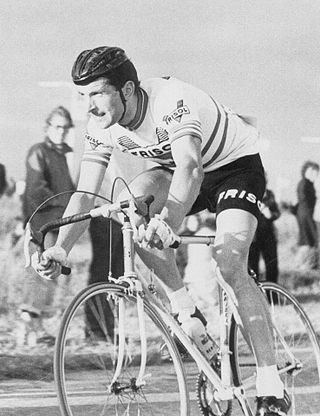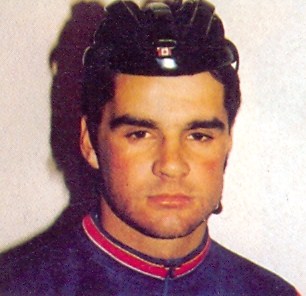Related Research Articles

Miguel Induráin Larraya is a retired Spanish road racing cyclist. Induráin won five Tours de France from 1991 to 1995, the fourth, and last, to win five times, and the only five-time winner to achieve those victories consecutively.

David Millar is a Scottish retired professional road racing cyclist. He rode for Cofidis from 1997 to 2004 and Garmin–Sharp from 2008 to 2014. He has won four stages of the Tour de France, five of the Vuelta a España and one stage of the Giro d'Italia. He was the British national road champion and the national time trial champion, both in 2007.

The Tour of Britain is a multi-stage cycling race, conducted on British roads, in which participants race across Great Britain to complete the race in the fastest time.

Sean Yates is an English former professional cyclist and directeur sportif.

Malcolm Elliott is a former English professional cyclist, whose professional career has lasted from 1984 to 1997 when he retired and from 2003 up to 2011 when he made his comeback in British domestic racing.

Fedor Iwan den Hertog was a Dutch racing cyclist. His sporting career began with De Ijsselstreek Wezep. He won the Olympic 100 km team time trial in 1968 with Joop Zoetemelk, René Pijnen and Jan Krekels. He also won the national road championship in 1977.
Arthur Metcalfe was a British racing cyclist who twice rode the Tour de France and, as an amateur remains the only male rider to win the British road race championship and the British Best All-Rounder (BBAR) time trial competition in the same year.
Dave Bedwell was one of Great Britain's most accomplished racing cyclists in the 1950s, known as the "Iron Man" of cycling. He won four stages in the first Tour of Britain, rode for Britain in the world professional road championship in 1953 and 1956 and rode for Britain in the Tour de France.
Colin Lewis was a British racing cyclist. He started racing at 19 and rode the Milk Race in 1960, finishing 7th.
Charles William Messenger was a British cyclist, a former Milk Race organiser and British road team manager.

John P Herety is a former English racing cyclist. He rode for Great Britain in the Olympic Games and won the national road championship as a professional. He is currently manager of the JLT–Condor cycling team, and occasionally provides studio-based analysis of cycle races for British Eurosport.

Vincent Denson is a former professional racing cyclist who rode the Tour de France, won a stage of the Giro d'Italia and won the Tour of Luxembourg in the 1960s.
Keith Butler was a British cycling champion who raced as a professional in Belgium and France and who later organised cycle races in England.

Steve Joughin is a former professional Manx road racing cyclist. He was the first Manxman ever win the British professional road race title. He is arguably one of the best UK riders of his generation, riding in the 1980s.
Robert John Maitland was a British racing cyclist. He won national championships in Britain, tackled long-distance records, was the best-placed British rider in the 1948 Olympic road race, and rode for Britain in the Tour de France. His career coincided with a civil war within British cycling as two organisations, the National Cyclists Union and the British League of Racing Cyclists, fought for the future of road racing.
Geoff Wiles is an English former professional racing cyclist.

John "Ian" Steel was a Scottish racing cyclist who in 1952 won the Peace Race, a central European race between Warsaw, Berlin and Prague. He was the only Briton, and the only rider from the English-speaking world to win it, as well as the first Briton to win any major race. He also won the Tour of Britain as a semi-professional and was at one stage second in the 1952 Tour of Mexico before crashing.

Mark Bell was an English professional cyclist from Birkenhead. He rode for Britain in the Olympic Games, won the national road championship as an amateur and then a professional and was the first foreigner to win the Étoile de Sud stage race in Belgium. He died at 49 after collapsing at his home in Bebington, Wirral. He had recently recovered from alcoholism.
Chris Walker is a male former professional cyclist from Sheffield. He represented England in the road race, at the 1998 Commonwealth Games in Kuala Lumpur, Malaysia.
David J. Akam is a retired track and road cyclist. He was active professionally between 1984 and 1987.
References
- ↑ West was known among fellow professionals and particularly in the Holdsworth team as Grisby Welch. The name came from the result of a race in Belgium. West had come high enough to be named in the following day's papers but, as a foreigner, he was unknown to reporters and officials. They checked his race number against the signing-on sheet and deciphered "Leslie West" as "Grisby Welch."
- ↑ Cycling Weekly, UK, 12 October 1992
- 1 2 3 4 Cycling Weekly 13 December 2007
- 1 2 3 4 5 6 Cycling Weekly, UK, 5 December 1992
- ↑ Woodland, Les (1980), Dope, the use of drugs in sport, David and Charles, UK, p112
- ↑ Daily Telegraph, 29 August 2004, Cycling news, West Still hooked on adrenalin, by Mark Hodginkson
- ↑ Te Fanatiek, Wielersport, the Netherlands, undated cutting. Dolman died in 1993, aged 47.
- 1 2 Woodland, Les (2005), This Island Race, Mousehold Press, UK, p122
- ↑ West had a full-time job throughout his amateur years and even as a professional. He trained three nights a week after work.
- ↑ More than he could have earned in other teams.
- ↑ "Les West Olympic Results". sports-reference.com. Archived from the original on 18 April 2020. Retrieved 13 September 2014.
- ↑ Cycling, 12 April 1969, p2
- ↑ Cycling Weekly, 12 December 1992, p34
- 1 2 The West Way, Winning, UK, undated cutting
- ↑ Cycling Weekly, UK, 17 February 1996, p16
- ↑ Cycling Weekly, UK, 17 February 1996, p18
- ↑ British Cycling, Archives, The Legend that is Les West -- Still a Champion Archived 9 July 2010 at the Wayback Machine
- ↑ "Staffordshire and Cheshire with Les West". September 2012.
- ↑ "50 Cycling Heroes Named in British Cycling's Hall of Fame". British Cycling. 17 December 2009. Archived from the original on 20 December 2009.